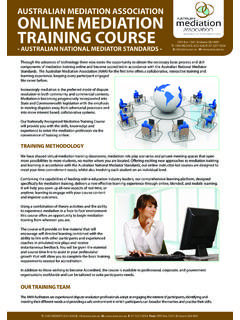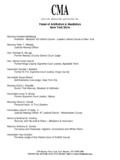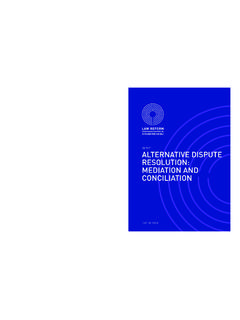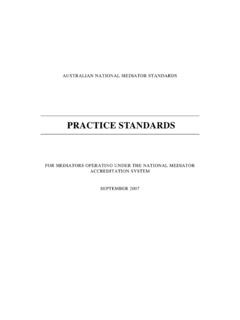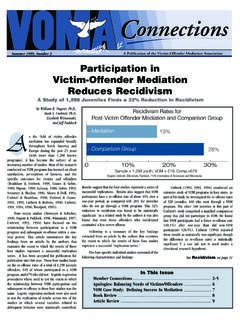Transcription of Improving Lawyers’ Judgment: Is Mediation Training De …
1 \\jciprod01\productn\H\HNR\21-1\ unknown Seq: 1 31-MAR-16 9:08. Improving lawyers ' Judgment: Is Mediation Training De-Biasing? Douglas N. Frenkel* & James H. Stark**. ABSTRACT. When people are placed in a partisan role or otherwise have an objective they seek to accomplish, they are prone to pervasive cognitive and motivational biases. These judgmental distortions can affect what people believe and wish to find out, the predic- tions they make, the strategic decisions they employ, and what they think is fair. A classic example is confirmation bias, which can cause its victims to seek and interpret information in ways that are consistent with their pre-existing views or the goals they aim to achieve. Studies consistently show that experts as well as laypeople are prone to such biases, and that they are highly resis- tant to change, in large part because people are generally una- ware that they are operating.
2 When they affect lawyers , egocentric, partisan and role bi- ases can hinder the ability to provide objective advice to clients, lead to overly optimistic forecasts about the probability of future events, and promote we-they thinking that can exacerbate and prolong conflicts, imposing substantial costs on both clients and society. There is reason to believe that by placing people in a media- tive stance one in which people impartially try to help dispu- tants resolve a conflict they can develop habits of objectivity crucial to much of what lawyers are called upon to do. That this is so is supported by social science research on two specific strate- gies for de-biasing judgment considering alternative scenarios and taking another's perspective both core mediator mindsets. Research also shows that active engagement in such de-biasing * Morris Shuster Practice Professor of Law and Director of the Mediation Clinic, University of Pennsylvania Law School.
3 * Roger Sherman Professor of Law and Director of the Mediation Clinic, Uni- versity of Connecticut School of Law. 1. \\jciprod01\productn\H\HNR\21-1\ unknown Seq: 2 31-MAR-16 9:08. 2 Harvard Negotiation Law Review [Vol. 21:1. activity is more effective in achieving objectivity than is mere in- struction about the existence of cognitive biases. The authors con- sider the implications of this research for law school clinical programming and legal education in general. CONTENTS. I. Introduction .. 2 R. II. Biases Affecting lawyers ' Judgment When Acting in a Representative Role .. 8 R. III. How Mediators are Trained to Think and Act, and What is Unique About Their Role .. 17 R. IV. De-Biasing by Considering the Opposite .. 22 R. A. Consider the Opposite and Legal Disputing .. 28 R.]
4 B. Mediation Questions and Applications .. 31 R. V. De-Biasing Through Perspective-Taking .. 34 R. A. Perspective-Taking and Lawyering: Negotiation Studies .. 40 R. B. Perspective-Taking and the Anchoring Bias .. 40 R. C. Perspective-Taking and the Fixed Pie Bias .. 41 R. D. Mediation Questions and Applications .. 43 R. VI. General Discussion .. 46 R. A. Limitations of Current Research and Possible Topics for Future Study .. 46 R. B. Will Mediation Training Transfer to Representational Lawyering? .. 49 R. C. Curricular Implications for Law Schools and Clinical Programming .. 53 R. I. INTRODUCTION. The two of us are experienced clinical law teachers who for many years have taught students to work as mediators. We each made the transition to teaching Mediation after first careers teaching and su- pervising law students in traditional public interest advocacy 1.
5 Doug Frenkel began his lawyering career as a legal services litigator and en- tered clinical teaching in 1978 as an instructor in the University of Pennsylvania's original litigation-based clinical course. From 1980 to 2008, he served as the Director of Penn's clinical education program, overseeing the design and expansion of a curric- ulum that came to include seven courses set in diverse lawyering roles. In 1986 he founded Penn's Mediation Clinic, a course he has led and taught ever since. Jim Stark has been a clinical law teacher since 1974. For the first half of his career, he primarily did civil rights advocacy work, in fields ranging from prisoners' rights, to special education and disability rights, to housing and employment discrimination litigation. He made the transition to Mediation teaching in 1994, and wrote about his \\jciprod01\productn\H\HNR\21-1\ unknown Seq: 3 31-MAR-16 9:08.
6 Fall 2015] Improving lawyers ' Judgment 3. Over the years, skeptical colleagues (especially clinicians) have asked, Why train students in Mediation , when most of them will be- come representative lawyers ? Taking stock of our choices, we de- cided to articulate what we think may be uniquely valuable about this work. Early on in our research efforts, we came across a provocative finding. A 2008 large-scale empirical study2 of settlement decision making in cases involving more than 5000 California litigators in more than 2000 actual contested cases found, consistent with other, earlier studies,3 that parties to litigation commonly make erroneous settlement decisions, rejecting settlement offers that are better than the results that they ultimately achieve at According to the 2008 study, neither case type nor the number of years of their law- yers' litigation experience, nor the ranking of the law school from which their attorneys graduated had an appreciable effect on these error What did matter was whether a party's lawyer self-iden- tified as having had Mediation Training and experience.
7 In most of the cases in which one or both of the litigants was represented by an experience two years later. James H. Stark, Preliminary Reflections on the Establish- ment of a Mediation Clinic, 2 CLINICAL L. REV. 457 (1996). We are grateful for helpful feedback received on drafts of this paper in its various stages of development from participants at the 2013 Clinical Teachers' Conference, the New York Law School Clinical Theory Workshop, the UNLV Law School Psychol- ogy and Lawyering Conference, the Cardozo Law School Works-in Progress Confer- ence, the University of Connecticut Law School Faculty Workshop Program, the American Bar Association Section on Dispute Resolution Webinar and the Quin- nipiac-Yale Dispute Resolution Workshop. In addition, we wish to express our thanks to Jon Bauer, Robert Condlin, Art Hinshaw, Jon Hyman, John Lande, Elliott Milstein and Sean Nolan for their helpful comments along the way.
8 2. Randall L. Kiser, Martin A. Asher & Blakely B. McShane, Let's Not Make a Deal: An Empirical Study of Decision Making in Unsuccessful Settlement Negotiation, 5 J. EMPIRICAL LEGAL STUD. 551 (2008) (hereinafter, California study or Kiser et al. ) For a later, expanded discussion of this study, see RANDALL KISER, BEYOND RIGHT. AND WRONG: THE POWER OF EFFECTIVE DECISION MAKING FOR ATTORNEYS AND CLIENTS. 32-86 (2010) (hereinafter, BEYOND RIGHT AND WRONG. ). 3. Kiser et al, supra note 2, at 566-67. 4. Id. at 563, defining a decision error as occurring when a plaintiff or defen- dant rejects an adversary's settlement offer, proceeds to trial, and finds that the trial result is substantially the same as, or worse than, the rejected settlement offer the oops' phenomenon. Overall, plaintiffs made decision errors in of their cases, while defendants made errors in of theirs.
9 However, when defendants made errors, they tended to be whoppers, with a mean error size of $1,140,000. The mean error size for plaintiffs was $43,100. Id. at 566-67. 5. Id. at 570-71. \\jciprod01\productn\H\HNR\21-1\ unknown Seq: 4 31-MAR-16 9:08. 4 Harvard Negotiation Law Review [Vol. 21:1. attorney-mediator, 6 both rates and magnitude of decision error were reduced in some classes of cases quite This data which the authors spend little time attempting to ex- plain and which raises more questions than it answers resonated with our intuitions: that placing law students in a dispassionate stance in a neutral, impartial role vis-a-vis ` competing parties can produce distinctive educational advantages in preparing them for cli- ent representation. To test our intuitions, we decided to examine what social science research might teach us about the value of dis- tance, dispassion or neutrality in professional education generally.]
10 We began to look at the extensive behavioral economics litera- ture on heuristics and cognitive biases and their effects on judgment under uncertainty, as well as the (less extensive, but still considera- ble) social science literature on techniques of de-biasing. Might it re- ally be the case that lawyers trained and working as mediators develop mindsets that are less subject to cognitive and motivational bias than lawyers without such Training ? If so, are such habits of mind lasting? Do they transfer to other professional roles which a Mediation -trained lawyer might assume? If so (and it is a big if ), this would be a finding with potentially significant implications for legal education. 6. This term was defined, somewhat vaguely, to include lawyers serving on court-annexed Mediation panels, affiliated with private dispute resolution companies, or designated as members of the Southern California Mediation Association.
